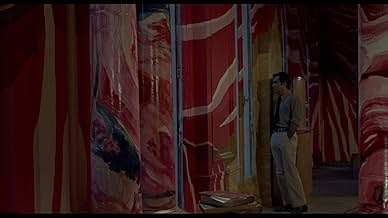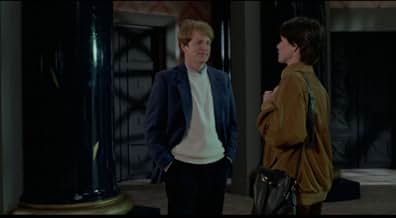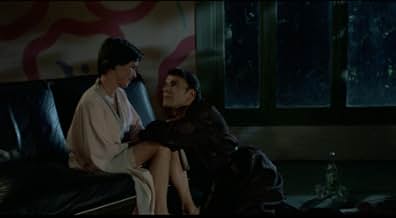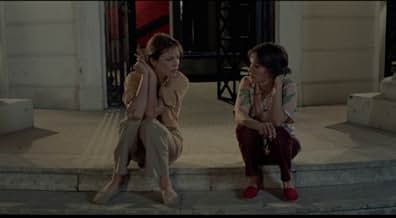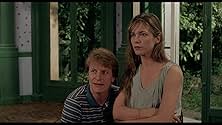Agrega una trama en tu idiomaA play within a play within a play within a play. Actors perform a play in a house; an audience member invites them to work in his own home improvising a play around his own life. The line b... Leer todoA play within a play within a play within a play. Actors perform a play in a house; an audience member invites them to work in his own home improvising a play around his own life. The line between fiction and reality blurs.A play within a play within a play within a play. Actors perform a play in a house; an audience member invites them to work in his own home improvising a play around his own life. The line between fiction and reality blurs.
- Dirección
- Guionistas
- Elenco
- Premios
- 1 nominación en total
Opiniones destacadas
There are reasons that Rivette is the least known of the New Wave directors..
For some this will feel like a slow drag (the director's cut is running 169mn long), but a few others will enjoy the blend of theatre and life itself that turns into one big messy, ecstatic stew, bubbling over with emotions, both performed and deeply felt.
Stars two larger than life actors. Jane birkin, as in the "birkin bag" and geraldine chaplin, daughter of charlie chaplin. As the description says, it's a play, within a play. Within a play. Confusing. This one is quite ethereal. Not quite sure what's going on, pretty hard to follow. Even more so with the subtitles, as it's in french. And most of the reviewers don't seem to know what's really going on either, so I'm not alone. The audience is invited into the house of the people living their lives. Directed by jacques rivette. He has won numerous film fest awards. Some similarities to "synecdoche new york" from 2008, where phillip hoffman hires people to make a real time play about his own life. That one has a more cohesive plot... the lead is slowly losing track of reality, and it gets more and more confusing as the actors try to keep up with with the lead, who is coming undone. They are both hard to follow. For those with the patience.
I think the reason that Rivette is the least popular -- yet by far the most secret, profound and precious -- of the New Wave directors is that he can't be pinned down to a belief. He isn't political, though corporate conspiracies are a factor in many of his films; he isn't an occultist, though his films are filled with Zodiacal symbols, the tarot, magicians; he isn't interested in putting humans under the microscope like Rohmer, though he is minutely attentive to what breaks people apart and brings them together. No; rather, politics, the occult, and humanity are like the vines tying together the raft through which he floats in the void. They are methods to generate material, curiosity and, as lit students would say, a narrative where none necessarily exists. I hope I'm making this clear -- Rivette actually LONGS FOR a worldwide political conspiracy, preferably controlled by a dark magus operating from some deceptively plain apartment in Paris, with the whole human comedy under his spell, because he knows that the alternative, what most people call "reality," would be soul death. He wants more mystery, more confusion, more action. Unlike Godard, he isn't looking for utopias, certainly not those that can be brought about by politics; he wants the world to be as it is, in all its unfathomable, malevolent, messy beauty.
As Jean-Pierre Kalfon says in L'Amour Par Terre one of Rivette's most insidious and fascinating films, by the way -- "I don't want to make life better than it is; I want life." Rivette, like many filmmakers who have disavowed their faith, has really only sublimated his religious quest. His obsession with the creative process, its false starts, abrupt detours and unknown destinations, is unmistakably of a spiritual nature. As it turns out, he is obsessed with stories because the world as we know it exists in order to contain them. For Rivette, God is not an obscure savior ( what are we being saved from? ) but a generator of fictional material, the ultimate creative artist. If the other world is defined by its permanence, its frozen perfection, this one must contain everything that can possibly exist, and the human artist, such as Rivette, then becomes like a sort of middleman between heaven and earth -- he gives form to the transitory, thus translating it for eternity.
Rivette's "strangeness" can be boiled down to his attempt to mirror God's mind by disavowing any ultimate truth. God requires stories in order not to be bored; stories require a world ruled by space and time where they can play out in a bounded setting, with a beginning and end; the world requires life in order to act out these stories. Stories, in short, require that we die. The two words that best describe Rivette's movies, "dark" and "childlike," come from the fact that, to accept that we are in a virtual, fictional realm, you must become as naive as a child for whom death is not real, yet who is subconsciously haunted by what it might mean. We die, but only because we're in a play. We die as children, but the curtain eventually rises ( he finally gives us a peek at what's behind it in his presumably final film, Marie et Julien. ) All this and more is part of why Rivette is so successful at blending the occult and the everyday there is nothing more occult than the fact that we're here at all, pretending we know what we're doing.
As Jean-Pierre Kalfon says in L'Amour Par Terre one of Rivette's most insidious and fascinating films, by the way -- "I don't want to make life better than it is; I want life." Rivette, like many filmmakers who have disavowed their faith, has really only sublimated his religious quest. His obsession with the creative process, its false starts, abrupt detours and unknown destinations, is unmistakably of a spiritual nature. As it turns out, he is obsessed with stories because the world as we know it exists in order to contain them. For Rivette, God is not an obscure savior ( what are we being saved from? ) but a generator of fictional material, the ultimate creative artist. If the other world is defined by its permanence, its frozen perfection, this one must contain everything that can possibly exist, and the human artist, such as Rivette, then becomes like a sort of middleman between heaven and earth -- he gives form to the transitory, thus translating it for eternity.
Rivette's "strangeness" can be boiled down to his attempt to mirror God's mind by disavowing any ultimate truth. God requires stories in order not to be bored; stories require a world ruled by space and time where they can play out in a bounded setting, with a beginning and end; the world requires life in order to act out these stories. Stories, in short, require that we die. The two words that best describe Rivette's movies, "dark" and "childlike," come from the fact that, to accept that we are in a virtual, fictional realm, you must become as naive as a child for whom death is not real, yet who is subconsciously haunted by what it might mean. We die, but only because we're in a play. We die as children, but the curtain eventually rises ( he finally gives us a peek at what's behind it in his presumably final film, Marie et Julien. ) All this and more is part of why Rivette is so successful at blending the occult and the everyday there is nothing more occult than the fact that we're here at all, pretending we know what we're doing.
My review was written in October 1984 after a New York Film Festival screening.
Jacques Rivette's "Love on the Ground" is a gamesplaying effort that unfortunately misses its opportunities for flights of fancy, remaining an Earthbound exercise. Rivette's loyal local following and the potent box office lure of stars Jane Birkin and Geraldine Chaplin augur good results in film's French release, but U. S. distribution by Spectrafilm faces an uphill battle.
A promising opening introduces three actors (Birkin, Chaplin and Facundo Bo) performing a Sunday night play in the rooms and corridors of their apartment. Among the casual spectators, who lurk just beyond the action (immediately setting up Rivette's usual duality between what is theater and what is "real" in his film) is a playwright Clement (Jean-Pierre Kalfon) whose work is being mangled by the trio. Instead of suing them, he hires them to enact a new playh at his mansion the following Saturday, one performance only., with the fourth act to be delivered at the last moment. The two women also are invited to move into the mansion for rehearsals, and they accept.
What unfolds is a weak satire of gothic melodramas, loaded with portentous dialog and saddled with numerous rehearsal scenes of a boring play. Rivette's gimmick is to have the play be autobiographical, concerning Clement's triangular love affair with Beatrice (since disappeared) and Pual (Andre Dussolier), latter a nightclub magician who, a la Tyrone Power in "Nightmare Alley", has gone beyond tricks into truly supernatural actions. He is also at the mansion, exerting his powers ove the two actresses, who briefly hallucinate future events involving themselves.
Rivette is working in familiar territory, not only from his previous films such as "L'amour fou" and "Celina and Julie Go Boating" but elated other works by former collaborators such as Eduardo de Gregorio's "Serail". The main problem is that his characters remain mere puppets in an elaborate, contrived game holding little intrinsic interest. Having the characters manipulate each other doesn't work since the plot changes are largely arbitrary, exemplified by an unconvincing, strictly functional, violent fight between Birkin and Chaplin midway through the film.
In place of fantasy, the film relies on well-disguised cuts to create the illusion of Chaplin and Birkin seeing themselves in their hallucinations; a mysterious room upstairs which emits sound effects of the sea, birds and orchestra tuning up (about as exciting as someone playing a sound effects record) and arresting pastel painted sets at the mansion.
Within a tongue-in-cheek format poking light fun at all the role-players, Chaplin and Birkin acquit themselves well though they're a bit too old for their parts. Kalfon is suitably sinister and Laszlo Szabo contributes several funny scenes as the unctuous "pussycat" of a butler/handyman working for Kalfon. Sandra Montaigu (star of "Lucie sur Seine") has some sharp verbal exchanges as the current, disgruntled woman of the house.
Pat ending, in which many details are tied up neatly and characters indulge in a series of one-upmanship games regarding the play's finale, is self-destructive, leading the viewer to wonder: is that all this was about? Obviously, Rivette is continuing his examination of theatrical devices but that was done far better in the serious context of his best film, "L'amour fou".
Jacques Rivette's "Love on the Ground" is a gamesplaying effort that unfortunately misses its opportunities for flights of fancy, remaining an Earthbound exercise. Rivette's loyal local following and the potent box office lure of stars Jane Birkin and Geraldine Chaplin augur good results in film's French release, but U. S. distribution by Spectrafilm faces an uphill battle.
A promising opening introduces three actors (Birkin, Chaplin and Facundo Bo) performing a Sunday night play in the rooms and corridors of their apartment. Among the casual spectators, who lurk just beyond the action (immediately setting up Rivette's usual duality between what is theater and what is "real" in his film) is a playwright Clement (Jean-Pierre Kalfon) whose work is being mangled by the trio. Instead of suing them, he hires them to enact a new playh at his mansion the following Saturday, one performance only., with the fourth act to be delivered at the last moment. The two women also are invited to move into the mansion for rehearsals, and they accept.
What unfolds is a weak satire of gothic melodramas, loaded with portentous dialog and saddled with numerous rehearsal scenes of a boring play. Rivette's gimmick is to have the play be autobiographical, concerning Clement's triangular love affair with Beatrice (since disappeared) and Pual (Andre Dussolier), latter a nightclub magician who, a la Tyrone Power in "Nightmare Alley", has gone beyond tricks into truly supernatural actions. He is also at the mansion, exerting his powers ove the two actresses, who briefly hallucinate future events involving themselves.
Rivette is working in familiar territory, not only from his previous films such as "L'amour fou" and "Celina and Julie Go Boating" but elated other works by former collaborators such as Eduardo de Gregorio's "Serail". The main problem is that his characters remain mere puppets in an elaborate, contrived game holding little intrinsic interest. Having the characters manipulate each other doesn't work since the plot changes are largely arbitrary, exemplified by an unconvincing, strictly functional, violent fight between Birkin and Chaplin midway through the film.
In place of fantasy, the film relies on well-disguised cuts to create the illusion of Chaplin and Birkin seeing themselves in their hallucinations; a mysterious room upstairs which emits sound effects of the sea, birds and orchestra tuning up (about as exciting as someone playing a sound effects record) and arresting pastel painted sets at the mansion.
Within a tongue-in-cheek format poking light fun at all the role-players, Chaplin and Birkin acquit themselves well though they're a bit too old for their parts. Kalfon is suitably sinister and Laszlo Szabo contributes several funny scenes as the unctuous "pussycat" of a butler/handyman working for Kalfon. Sandra Montaigu (star of "Lucie sur Seine") has some sharp verbal exchanges as the current, disgruntled woman of the house.
Pat ending, in which many details are tied up neatly and characters indulge in a series of one-upmanship games regarding the play's finale, is self-destructive, leading the viewer to wonder: is that all this was about? Obviously, Rivette is continuing his examination of theatrical devices but that was done far better in the serious context of his best film, "L'amour fou".
If you ever feel tired of the noise, the speed, the clutter of modern cinema, take a nice long (in this case, 169 minutes long - in the Director's Cut) break from all of it with a Jacques Rivette film; it's an experience like no other. As far from "art for art's sake" as it is from the mainstream, "Love On The Ground" is simultaneously very simple and very complicated: it's about the artistic process, the way life influences art (and vice versa), the quest for love, random human encounters (in the metro, in a bar), and magical visions of the future! It's not for every taste or mood, but if you are in the right mood (I was), you'll probably find it refreshingly unhurried and thoroughly absorbing. *** out of 4.
¿Sabías que…?
- TriviaThe 2 main characters are called Emily and Charlotte. This is probably a reference to the Brontë sisters, especially in view of the fact that the following film by Rivette was Wuthering Heights (Hurlevent).
- Versiones alternativasThere is also a 2 hour and 48 minute version.
- ConexionesReferences Nashville (1975)
Selecciones populares
Inicia sesión para calificar y agrega a la lista de videos para obtener recomendaciones personalizadas
- How long is Love on the Ground?Con tecnología de Alexa
Detalles
- Tiempo de ejecución
- 2h 5min(125 min)
- Mezcla de sonido
Contribuir a esta página
Sugiere una edición o agrega el contenido que falta


